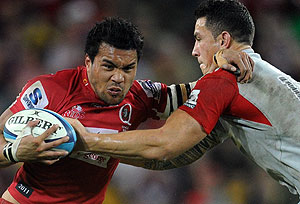The ability to control the momentum of a game is a feature of great teams. Once it changes, so do the fortunes of the participants.
In the first twenty minutes of the Blues-Waratahs quarter final, there was only one team in it. The Tahs controlled the ball superbly, mounting raid after raid, with the Blues continually on the back foot. After Tom Carter muscled his way over in the corner, victory appeared to be theirs for the taking.
But then came the turning point of the game: with the Blues at sixes and sevens, Lachie Tuner collected the ball in midfield play, ran a few steps, and needlessly kicked it away……
From this the Blues were able to regain possession, build pressure, convert it into points, and take the lead. The Tahs entered the dressing shed at halftime with the game having already slipped from their grasp.
Old habits die hard, and Josh Holmes was guilty of kicking the ball away on several occasions just when there appeared glimmers of hope that the Tahs might retain possession and re-build momentum.
The value of kicking for touch was also nullified as wayward throwing from third string hooker John Ulugia made the Tahs lineout a liability.
In a further cruel reflection of the Tahs’ season, any hope of a comeback in the second half was crippled when key forwards bit the dust: Kane Douglas had his knee sickeningly rearranged, Timani hobbled from the field, and Phil Waugh was clearly struggling before being replaced.
Holmes had a poor game, with his service to the backs far too slow, and should have been replaced by McKibbin much earlier than the dying minutes.
But there were positives. Pakalani, who hitherto had reminded this writer of a schoolboy playing in the big league, had an excellent game, regularly getting involved and threatening the opposition line.
Fourth string tighthead, Paddy Ryan, is a big unit who held his own against the powerful Blues scrum and looks to have a bright future ahead of him.
Like he had done all season, Kurtley Beale played his heart out in his final game for the team, and as the camera zoomed in on him after the final whistle, he struggled to hide the tears in his eyes.
One more Tahs player to mention: this was Phil Waugh's last game. As he rides off into the sunset, he will be remembered as one of the toughest players to ever wear a Waratahs jersey.
Kurtley and Phil, the Tahs' will miss you.




